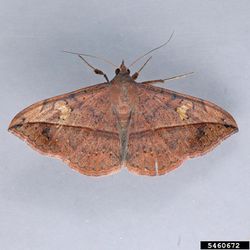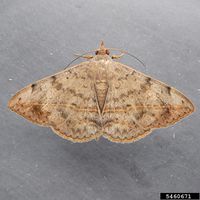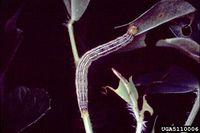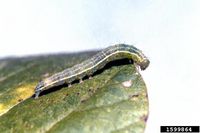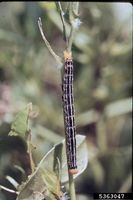Difference between revisions of "Anticarsia gemmatalis"
| (One intermediate revision by the same user not shown) | |||
| Line 1: | Line 1: | ||
{{TaxLinks|LnkAnticarsia}} | {{TaxLinks|LnkAnticarsia}} | ||
| − | {{ | + | {{LiteratureDBX|{{PAGENAME}}|757|browse,Ccountrylnk,Pcrops,AbenefialsN}} |
[[File:Anticarsia_gemmatalis_IPM5460672.jpg|250px|thumb|''Anticarsia gemmatalis'' (click on image to enlarge it)<br/>Author(s): Mark Dreiling<br/>Source: [http://www.ipmimages.org/browse/detail.cfm?imgnum=5460672 IPM Images]]] | [[File:Anticarsia_gemmatalis_IPM5460672.jpg|250px|thumb|''Anticarsia gemmatalis'' (click on image to enlarge it)<br/>Author(s): Mark Dreiling<br/>Source: [http://www.ipmimages.org/browse/detail.cfm?imgnum=5460672 IPM Images]]] | ||
| − | <font color="#800000">'''''Anticarsia gemmatalis'''''</font> Hübner, 1818 - (velvetbean caterpillar) | + | <font color="#800000">'''''Anticarsia gemmatalis'''''</font> Hübner, 1818 - (velvetbean caterpillar) |
| − | is an important pest of soybean in the Americas which can cause extensive defoliation. It might also feed on other legumes like groundnuts. The species overwinters in the American tropics and subtropics, but can migrate to more temperate regions during the summer. In several areas it is considered the most important insect pest on soybean. The development from egg, through 6 larval stages, to mature adult lasts around 4-6 weeks, but varies considerably with temperature. | + | |
| + | The moth is an important pest of soybean in the Americas which can cause extensive defoliation. It might also feed on other legumes like groundnuts. The species overwinters in the American tropics and subtropics, but can migrate to more temperate regions during the summer. In several areas it is considered the most important insect pest on soybean. The development from egg, through 6 larval stages, to mature adult lasts around 4-6 weeks, but varies considerably with temperature. | ||
Early planting can reduce the damage. Apart from insecticides, biological control, like the [[Anticarsia gemmatalis multiple NPV (entomopathogen)|''Anticarsia gemmatalis'' nuclear polyhedrosis virus]] has been used on a large scale in parts of South America. | Early planting can reduce the damage. Apart from insecticides, biological control, like the [[Anticarsia gemmatalis multiple NPV (entomopathogen)|''Anticarsia gemmatalis'' nuclear polyhedrosis virus]] has been used on a large scale in parts of South America. | ||
| Line 12: | Line 13: | ||
}} | }} | ||
The adults have a wingspan of 30-40 mm. The wings are yellowish-brown to dark brown, sometimes grayish, with darker marks. There is a conspicuous transverse line across both wings which is usually dark. The colouration of the larvae also varies and can be greenish to different shades of brown, to dark brown, usually with longitudinal lighter stripes. | The adults have a wingspan of 30-40 mm. The wings are yellowish-brown to dark brown, sometimes grayish, with darker marks. There is a conspicuous transverse line across both wings which is usually dark. The colouration of the larvae also varies and can be greenish to different shades of brown, to dark brown, usually with longitudinal lighter stripes. | ||
| + | |||
<gallery widths=200px caption="Other images of Anticarsia gemmatalis (IPM Images - click to enlarge)"> | <gallery widths=200px caption="Other images of Anticarsia gemmatalis (IPM Images - click to enlarge)"> | ||
Latest revision as of 20:36, 15 April 2022
| Literature database |
|---|
| 221 articles sorted by: |
| • year (descending) |
| • research topics |
| • countries/regions |
| • host plants |
| • list of natural enemies |
Anticarsia gemmatalis Hübner, 1818 - (velvetbean caterpillar)
The moth is an important pest of soybean in the Americas which can cause extensive defoliation. It might also feed on other legumes like groundnuts. The species overwinters in the American tropics and subtropics, but can migrate to more temperate regions during the summer. In several areas it is considered the most important insect pest on soybean. The development from egg, through 6 larval stages, to mature adult lasts around 4-6 weeks, but varies considerably with temperature.
Early planting can reduce the damage. Apart from insecticides, biological control, like the Anticarsia gemmatalis nuclear polyhedrosis virus has been used on a large scale in parts of South America.
| Vernacular names | |
|---|---|
| • English: | velvetbean caterpillar soybean caterpillar |
| • Español: | polilla migratoria gusano del frijol |
| • Português: | lagarta-da-soja |
The adults have a wingspan of 30-40 mm. The wings are yellowish-brown to dark brown, sometimes grayish, with darker marks. There is a conspicuous transverse line across both wings which is usually dark. The colouration of the larvae also varies and can be greenish to different shades of brown, to dark brown, usually with longitudinal lighter stripes.
- Other images of Anticarsia gemmatalis (IPM Images - click to enlarge)
